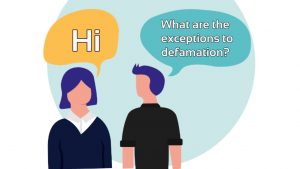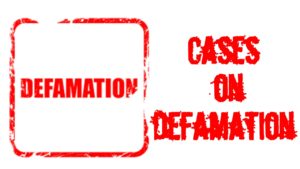Defences to the Tort of Defamation: A tort is a wrong which causes injury and thereby gives rise to an action for remedy. The law of tort is one of the branches of common law that has the highest number of litigations as it majorly addresses civil wrong.
There are three categories of torts to wit: intentional torts, negligence and strict liability. Intentional torts arises where the tortfeasor does an act on purpose; with the knowledge of the harm the action is likely to cause. That is, the tortfeasor knew quite well the consequences of his action, but nevertheless, went ahead to carry it out which finally results in the harm complained of by the victim.
Negligence as the second category of tort is to the effect that there is a breach of the duty of care on the part of the tortfeasor, which then results in his action causing harm to another. The intention to cause harm is absent, but a duty of care and reasonable foreseeability is inputed on him. It is more like saying, “you were supposed to be in the know that this particular act of yours will result in this harm but you were careless about it, hence liability is inputed on you for your lack of care“.

The final category of tort is strict liability. When strict liability is inputed on a tortfeasor, it is immaterial whether he had the intention or was careless about his action. The mere happening of the event leading to the harm is enough to prove his liability.
The Tort of defamation may either be committed intentionally, where one maliciously sets out to defame the character of another; or negligently, where he carelessly makes a statement which results in the defamation of the character of another.
Recommended: Notable cases in the law of defamation
Meaning & Essentials of Defamation
Defamation as a tort occurs when one makes a statement that injures the character of another thereby bringing his reputation to question in the eyes of right thinking members of the society of his class and standing. Where a statement is made that tends to spite the character, reputation, integrity and dignity of another in the eyes of right thinking members of the person’s class and social standing, he is said to have been defamed.
Defamation is of two classes. Libel and slander. Libel is a written statement which defames another. Written in the sense that the statement is in print, writing or published whether by voice recording or print media. On the other hand, slander is spoken words that defames another.
For the tort of defamation to hold sway, certain factors must be proved. First, it must be shown that the defendant made a statement and that the said statement made was false. The statement alleged to have been made must be false in its entirety or in part. If this is proved, then there is a prima facie case of defamation against the tortfeasor.
Secondly, the statement made must refer to the plaintiff. A plaintiff cannot just infer that a defamatory statement is made in reference to him without stating how such statement referred to him. There must be an easy or implied reference to the plaintiff before the claim of defamation can be maintained.
Thirdly, that the statement made was published and communicated to another person other than the plaintiff. Where a defendant makes a statement alleged to be defamatory but does not get it published or communicated to a third party, such statement will not amount to defamation. Again, if he communicates the content of that defamatory statement to the plaintiff alone, but the plaintiff does the publication himself, the defendant will not be liable for the tort of defamation. Communication or publication of the alleged defamatory statement to a third party must be proved to maintain a suit in defamation.
Finally, the plaintiff must show that he has suffered harm (injury) monetary or otherwise as a result of the defamatory statement. Where he cannot prove the existence of harm or injury, then it can be excused that defamation did not take place.

Recommended: How to sue someone in another country
Defences to Defamation
Like every common law tort, the tort of defamation has defences which serve as reliefs either in whole or in part. Defences such as justification, truth and absolute privilege serve as reliefs wholly in a defamation suit; while a defence like qualified privilege serve as relief in part.
1. Truth/Justification
A defendant will be absolved from liability in a defamatory suit if he can prove that the statement he made is true. He is justified with the truth of the statement and as such, will not suffer any liability for the said statement. For example, if Mr. A having been married to Mrs A contracts another marriage with Miss B without first dissolving his earlier marriage, he cannot sue for defamation if he is been called a bigamist.
To this end, truth is a defense in whole in a defamatory suit.
2. Absolute Privilege
Communication is vital in a society. If in the course of every conversation, any defamatory statement alleged to be contained therein is met with litigations, then the whole essence of communication will be defeated. It is in the light of this that certain categories of persons are immuned from liability if there is a defamatory content in their communications with people.
This protection afforded to the participants in this category of persons is referred to as absolute privilege. They are completely immuned from liability for any statement made in the course of performing their duties.
Parliamentarians are immuned from tortious liability for statements made during Parliamentary sessions. Again, a witness is protected from any action if his testimony in court will amount to defamation of the character of a person.
Absolute Privilege is a complete defence in an action for defamation.
Also see: How to Build a become a successful entrepreneur
3. Qualified Privilege
Just like absolute privilege, certain classes of persons are immuned from liability for defamation. However, this defence is only in part as a prove of malice aforethought can defeat it. That is, if the statement was made maliciously and mala fide, the defence of qualified privilege will not avail the defendant.
An example of this is where a former employer writes a report that is damaging of a former employee to a potential employer in his reference. If it can be proved that the report was made maliciously, then the defence will not avail him. This is covered under statements made by a person having a legal or moral obligation to do so.
Another example is statement made to further a legitimate interest; and statement made to protect one’s interest and reputation after being attacked publicly.
Also see: Barriers to effective communication and solutions
4. Fair Comment
Just like qualified privilege, the defence of fair comment is not a total defence. The defendant can be liable if the statement was made maliciously and in bad faith. The defense avails where one makes a fair criticism of matters of public interest. Also, if the statement is on matters that are notorious, it will not amount to defamation.

Also see: Differences between Civil law and criminal law
In all, the tort of defamation was made to create a balance between the rights to freedom of speech and the right to another’s dignity. The defences are also available to ensure that one does not suffer liability for statements made which are true or privileged, but does not however, cover statements made maliciously.

Edeh Samuel Chukwuemeka, ACMC, is a lawyer and a certified mediator/conciliator in Nigeria. He is also a developer with knowledge in various programming languages. Samuel is determined to leverage his skills in technology, SEO, and legal practice to revolutionize the legal profession worldwide by creating web and mobile applications that simplify legal research. Sam is also passionate about educating and providing valuable information to people.
